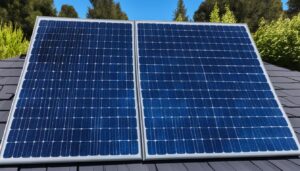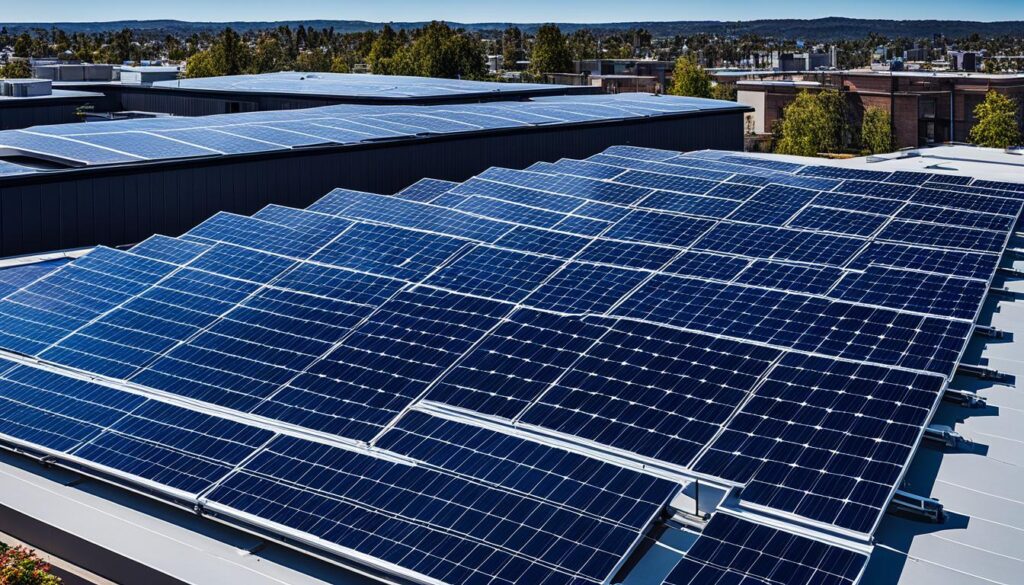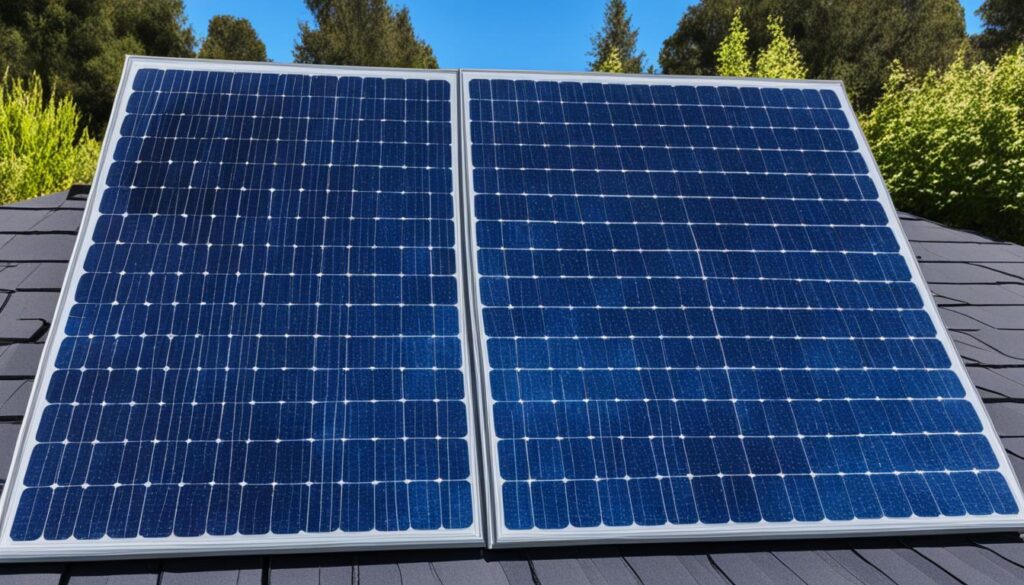When it comes to choosing the right solar panels for your energy needs, efficiency is a key factor to consider. Two main types of solar panels available in the market are N Type vs P Type Solar Panels . But what are the differences in efficiency between these two types? Let’s find out.
N-Type and P-Type solar panels differ in their construction and materials, which directly affect their efficiency ratings and power output. Understanding these differences can help you make an informed decision when it comes to your solar energy system.
In this article, we will compare the efficiency of N-Type and P-Type solar panels, exploring factors such as performance, power output, and overall efficiency. By the end, you will have a clearer understanding of which type of solar panel is more suitable for your specific needs.
Key Takeaways:
- N-Type and P-Type solar panels are two main types of solar panels available on the market.
- Efficiency is a crucial factor to consider when selecting solar panels.
- The construction and materials used in N-Type and P-Type panels directly impact their efficiency ratings and power output.
- Understanding the differences between N-Type and P-Type panels can help you make an informed decision for your solar energy system.
- By the end of this article, you will have insights into the efficiency of N-Type vs. P-Type solar panels.
N Type vs P Type Solar Panels: Key Differences Explained
In this section, we will delve into the key differences between n type and p type solar panels. Understanding these differences is crucial in determining which type of solar panel is best suited for your energy needs.
Materials and Electrical Charge Characteristics

N-Type and P-Type solar panels are constructed using different materials, leading to variations in their electrical charge characteristics. N-Type panels are made from silicon wafers with a layer of phosphorus on one side and a thin layer of boron on the other. This structure creates a negative charge on one side and a positive charge on the other, resulting in greater efficiency and generating more electricity.
“N-Type panels have a higher charge carrier mobility, which allows them to perform better in low-light or shaded conditions compared to P-Type panels.”
In contrast, P-Type solar panels have a simpler construction with a layer of boron diffused throughout the silicon wafers. The boron impurities create a positive charge, resulting in relatively lower efficiency and power output compared to N-Type panels.
Comparison of Durability and Performance Over Time
When it comes to durability and performance, N-Type solar panels have shown to be more resilient over time. N-Type panels have a higher tolerance to temperature variations, making them less prone to thermal degradation and ensuring consistent performance even in harsh environmental conditions.
Additionally, the protective layer on N-Type panels provides better resistance against potential-induced degradation (PID), a common issue that affects the performance of P-Type panels.
“N-Type solar panels tend to have a longer lifespan and better long-term performance compared to P-Type panels.”
P-Type panels, on the other hand, may experience a decrease in efficiency and power output over time due to factors such as light-induced degradation and the migration of impurities within the panel.
By considering the differences in materials, electrical charge characteristics, durability, and performance, you can make an informed decision when choosing between N-Type and P-Type solar panels based on your specific requirements.
The Advantages of N Type Solar Panel Technology
In this section, we will explore the N Type solar panel advantages . N-Type solar panels offer several benefits that make them a compelling choice for solar energy systems.
Enhanced Efficiency Levels and Energy Output
N type vs P type solar cells efficiency:-N-Type solar panels are known for their enhanced efficiency levels and higher energy output compared to P-Type panels. This is due to the unique properties of N-Type cells, such as the use of different materials and innovative manufacturing processes. The increased efficiency translates to more electricity production from the same amount of sunlight, making N-Type panels an excellent option for maximizing energy generation.

Resistance to Light-Induced Degradation
One common issue with P-Type solar panels is their susceptibility to light-induced degradation. Over time, prolonged exposure to sunlight can cause a decrease in performance and efficiency. However, N-Type solar panels are more resistant to this phenomenon, ensuring consistent and reliable energy production throughout their lifespan.
Long-Term Reliability and Return on Investment
Investing in N-Type solar panels offers long-term reliability and a high return on investment. These panels are built to withstand various environmental conditions and have a longer lifespan compared to other solar panel types. With their enhanced durability and reliable performance, N-Type panels can provide sustainable energy for many years, ensuring a solid return on your initial investment.
Understanding P Type Solar Panel Characteristics
In this section, we will provide an in-depth understanding of P-Type solar panel characteristics. P-Type solar panels have gained popularity in the solar energy industry due to their affordability, market availability, robustness against radiation, and historical performance. By exploring these key characteristics, you can determine if P-Type solar panels are suitable for your solar energy needs.
Affordability and Market Availability
P-Type solar panels are known for their affordability, making them an attractive option for residential and commercial installations. Their widespread adoption has resulted in a competitive market, driving prices down and increasing their availability. With P-Type panels, you can find a range of options at different price points, ensuring that you can select a solution that fits your budget and requirements.
Robustness Against Radiation and Historical Performance
P-Type solar panels exhibit robustness against radiation, making them highly resistant to damage from exposure to harsh sunlight and environmental factors. This characteristic ensures their long-term durability and reliability, even in challenging conditions. P-Type panels have a proven track record of historical performance, with many installations showcasing their ability to consistently generate stable and efficient solar energy over time.
| Characteristics | Affordability | Market Availability | Robustness Against Radiation | Historical Performance |
|---|---|---|---|---|
| Rating | High | High | High | Consistent |
| Benefits | – Suitable for various budgets | – Widespread availability | – Resistant to radiation damage | – Stable and efficient energy generation |
| Considerations | – Prices may vary based on brand and specifications | – Availability may vary based on location | – Requires proper installation and maintenance | – Performance can be affected by external factors |
Table: Overview comparison of n type and p type solar panels Characteristics.
As depicted in the table above, P-Type solar panels offer high affordability and market availability, making them accessible to a wide range of consumers. Their robustness against radiation and consistent historical performance further solidify their position as a reliable choice for solar energy generation. However, it’s important to consider factors such as brand, installation, and maintenance to maximize the performance and longevity of P-Type panels.
Conclusion
After exploring the efficiency, differences, advantages, and characteristics of N-Type and P-Type solar panels, you are now equipped with the knowledge to select the solar panel type that best suits your needs. When assessing your needs, consider factors such as efficiency levels, power output, durability, and long-term reliability.
If you prioritize enhanced efficiency and higher energy output, N-Type solar panels are the ideal choice. These panels offer improved performance and are resistant to light-induced degradation, ensuring long-term reliability and a solid return on investment. On the other hand, if affordability and market availability are key considerations, P-Type solar panels are a popular option with a proven track record.
Looking toward the future, it is important to stay informed about the latest trends in solar panel technology and manufacturing. Advancements and innovations in this industry are constantly emerging, opening up possibilities for even more efficient, durable, and sustainable solar panels. Keep an eye on developments in areas such as perovskite solar cells, bifacial panels, and smart solar technologies that could revolutionize the solar energy landscape.
Ultimately, the choice between N-Type and P-Type solar panels depends on your specific requirements and priorities. By considering the key differences, advantages, and future trends, you can make an informed decision that aligns with your needs and contributes to a cleaner, greener, and more sustainable future.
FAQ
What are the key differences between N-Type and P-Type solar panels?
N-Type and P-Type solar panels differ in terms of the materials used in their construction and their electrical charge characteristics. N-Type panels typically have higher efficiency and better performance over time compared to P-Type panels.
How do N-Type solar panels offer enhanced efficiency levels?
N-Type solar panels utilize advanced technology and high-quality materials, resulting in higher energy output and greater as compared to p type solar panel efficiency. This allows N-Type panels to generate more electricity from the same amount of sunlight.
What is the advantage of N-Type solar panels in terms of resistance to degradation?
N-Type solar panels are known for their resistance to light-induced degradation, which is a common issue with P-Type panels. This means that N-Type panels maintain their efficiency and performance levels for a longer time, resulting in higher reliability and durability over the lifespan of the solar panel system.
What are the advantages of choosing N-Type solar panel technology?
The advantages of N-Type solar panels include enhanced efficiency levels, higher energy output, resistance to light-induced degradation, and long-term reliability. These factors contribute to a higher return on investment and make N-Type panels an ideal choice for maximizing solar energy production.
How affordable and readily available are P-Type solar panels?
P-Type solar panels are widely available in the market and are generally more affordable compared to N-Type panels. Their widespread adoption in both residential and commercial sectors has contributed to their availability and competitive pricing.
What makes P-Type solar panels robust against radiation and have a strong historical performance?
P-Type solar panels have a proven track record of performance and reliability in various environmental conditions, including exposure to radiation. The materials used in P-Type panels have been extensively tested and optimized, ensuring their durability and long-lasting performance.
How can I assess which solar panel type suits my needs best?
To determine the best solar panel type for your needs, consider factors such as efficiency, cost, durability, and performance over time. Assess your specific requirements and consult with a solar energy professional to ensure you make an informed decision.
What are some future trends in solar panel technology and manufacturing?
The solar energy industry continues to innovate and develop new technologies. Some future trends in solar panel technology include the use of advanced materials, improved manufacturing processes, and increased integration with energy storage systems. These advancements aim to enhance efficiency, reduce costs, and make solar energy more accessible to a wider audience.

